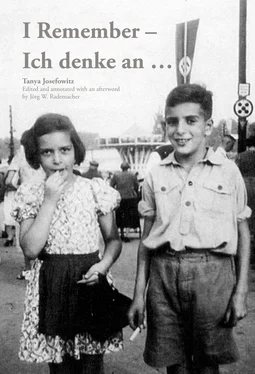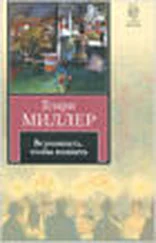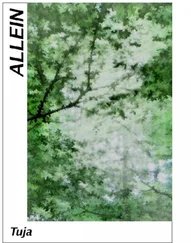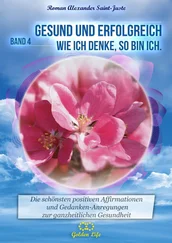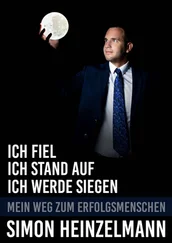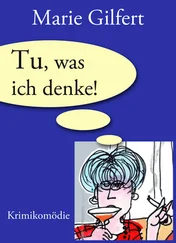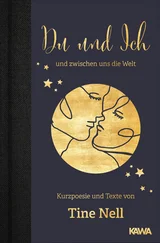Mother never made it to the diningroom. She was too ill with high temperature, feigning sea-sickness all the way, which seemed plausible since it was a rough crossing. Her doctor friends medicated her as best as possible, and I was finally taken to the ship’s doctor. After examination he was fully convinced that I was suffering from acute constipation and could only be helped by a massive dose of castor oil.
Again I cried and screamed. I had to be held down by the nurse, as they poured half a glass of the detestable liquid mixed with red wine down my throat. Once I had swallowed it, I was given chocolate flavored mints. The laxative worked and my pains subsided. I felt elated and for the first time in weeks the sun was shining on me again.
Vladimir and I were like the ship’s mascots. Everyone took care of us and spoiled us, “poor children roaming the ship alone because our mother was so sea-sick!” I did not realize how very ill she actually was, as she seemed to be sleeping most of the time. The trip was too short for us children. We loved it.
On the day of arrival Mother again was simulatingemotion rather than illness. Bundled into her coat, her collar high up, and a hanky covering her face, she feigned tears of joy. We got off the boat and were met by Diana, my cousin, and an even older cousin, Issi Glickin, who later became our private tutor and mentor. He taught us English, mathematics, history and everything concerning the American way of life. Needless to say, my Daddy and Aunt Mary were there as well. 15We cried, we laughed, we hugged and kissed each other and felt elated and relieved. And yet, I was bewildered and full of apprehension about the unknown and unfamiliar life that was expecting us.
We all took the train to East Orange, New Jersey, where Aunt Mary lived. 16This was to be our new home for the next month. It was evening, and Vladimir and I were not a bit tired – much too excited by all the new people, experiences and sights. I truly did not realize how ill my Mother was. She really was on her last breath. The doctor came, and cousin Diana who had taken leave of absence from her job for the next week, took care of my Mother day and night with inhalations, chicken soup, hot drinks and lots of love and devotion. Mother survived but only by the skin of her teeth. There was no penicillin as yet to cure her very severe pneumonia.
Vladimir and I were both overwhelmed with all the new experiences, delighted to be reunited with our Daddy, and to be spoiled by all the various cousins and their parents, our Aunty Mary and Uncle Max.
One of our main attractions was Uncle Max’s grocery store on the ground floor. It smelled of fresh ground coffee, smoked fish, hot pastrami and was full of the most fascinating items, from soap to nuts, to bubble gum and bagels, just to name a few. Our good-natured brilliant Uncle Max let us touch and taste everything in the shop.
Up the stairs on the first floor was my Aunt Mary, my father’s sister, who cuddled us into her big, soft bosom and spoke to us in Yiddish – which we could understand as it had a lot of similarity to German. We drank gallons of fresh orange juice and milk and our daily meal was chicken soup with vegetables. Then, we would run down to Uncle Max and he would cut us each a few slices of liverwurst and Salami which we devoured with gusto.
For a few weeks we were the center of attention. All our friends and family came to see the new arrivals – the refugees from Germany. We were often asked to sing our German songs and we obliged happily. To us children, it seemed a constant party. We met the neighboring children. There again, language posed no problem.
At first I was afraid of black people, never having seen any in Germany. But very soon many of my closest pals were black and many remained my friends throughout my life. Everything was new and different, the subway, skyscrapers, drug-stores and friendly cops. We took to American life like fish to water, and I was in seventh heaven.
I remember, when I was very young in Germany, we were told: “If you are naughty the policeman or the black man will get you!” Whatever that meant to me I don’t know, but it was a very scary threat.
Mother always claimed that it was my fantasy – that I had never been threatened by such words. Maybe so. There is one thing, however, I do remember. Several months after we came to the USA Mother was invited to lunch in Chinatown with friends. She took me with her, and as she was vastly in conversation, I wanted her attention and kept interrupting. She told me to be quiet or she’d give me a “ Watschen ” 17, meaning a slap on the cheek, a commonly used way of imposing discipline in Germany at the time. 18But I said to her: “No, you don’t, or I will report you to the police.” You see, once in the USA, I was no longer afraid of the police. My whole life was changing so quickly.
In Germany I don’t recallever having been allowed alone on the street or in a park, for fear of being spat at, or called “dirty Jew”. I remember a few such incidents, particularly once when our beloved nanny, Marianne, took us to her home, on an Easter weekend. Her family were farmers. They lived an hour away from Worms. My brother and I loved these visits. There were farm animals, plenty of fresh milk, butter, cakes and raw eggs that Vladimir liked to drink. This is unheard-of now, but at that time it was considered a delicacy. One simply put a pin prick in each end of the egg and sucked it out. I hated it without ever trying it.
On Easter Sunday, Marianne took us to her church for a beautiful ceremony. I loved going to church and I often went with Nanny. I was fascinated by the beauty of the stained glass windows and the smell of incense. It was all so solemn, silent, overwhelming: the voices of the choir and the pastor, the prayers, the kneeling and standing up, the sunshine outside on the soft green grass. After the ceremony we children all ran into the church yard to hunt for beautifully wrapped Easter eggs hidden among the flowers and bushes, and play games organized for us. We were told to form a large circle and to hold hands when out of the blue sky a blond little girl pushed me aside and said: “I won’t hold hands with you! You’re a dirty little Jew child!” Appalled and choked by tears, I ran away sobbing, never to return.
The worst, however, happened a year later: probably in 1936, when Marianne’s brother, a lovely young man who worked on their farm, was found drowned in the river near the town. Like every youth in Germany he had to join the Hitler Jugend 19, the official Nazi youth organization, which he hated. One day he spoke up against Hitler in the local pub and pulled down the Swastika flag in the town square. So they killed him. This tragedy hit us all like a nightmare. It was beyond words and I shall never forget it.
In 1933/34 Vladi and Iwent to a Kindergarten run by nuns, where we were very happy. Then a new law forbade Jewish and Gentile children to mingle, and we were put into the Jewish school, a very small building next to the Synagogue. Worms had the oldest synagogue in Germany, where, in the 11th century, the famous Talmud scholar Rashi 20was supposed to have taught. I loved it just as well as the churches. It too had a beautiful, mysterious aura about it. But its windows were smaller and inside it was darker. It had gray stone floors, worn down and wobbly from use, and dark brown wooden benches. What I loved best was the smell of the candles. I was fascinated by these candles. They were braided and interwoven, some in soft ivory colors, and some mixed with light blues and pinks. The synagogue was lit by these candles and there were no electric lights.
After school hours, we were allowed to play in the cemetery of the synagogue. It was safe. There were old graves overgrown by soft green moss and bushes, and a worn-down stone wall surrounded our school, the synagogue and the graveyard. This was our playground where we played hide and seek and other games and where we felt totally protected. One of the streets that led to our Jewish School was called the Judengasse 21– Jew Street. On this narrow, cobbled lane there was an old building with an indentation in its wall. It was said that a young, pregnant Jewish woman had walked this narrow street when one day a horse and carriage came along at great speed. It would have crushed her, but, by a miracle, the wall “gave in” and she was saved. I loved this story and believed it to be true. 22
Читать дальше
